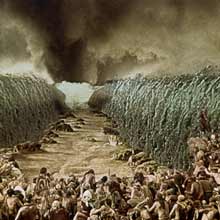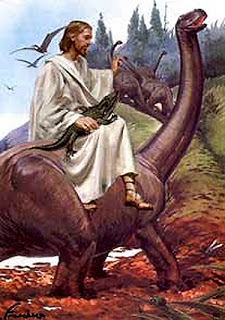The bible forms part of our shared cultural landscape, even if I don’t personally believe it to be divinely inspired or anything more than a collection of stories about mythological figures, Noah, Moses and Jesus included. But from a literary point of view, no other book has had the impact on Western civilization of the bible in terms of the imagery, the characters, the situations, and the phraseology. It should come as no surprise that these influences are to be found in Dungeons and Dragons, particularly as Gygax was himself a keen believer. For example…
Staff of the Serpent: When Pharaoh shall speak unto you, saying, Shew a miracle for you: then thou shalt say unto Aaron, Take thy rod, and cast before Pharaoh, it shall become a serpent. (Exodus 7:9)
Horn of Blasting: So the people shouted when [the priests] blew with the trumpets: and it came to pass, when the people heard the sound of the trumpet, and the people shouted with a great shout, that the wall fell down flat, so that the people went up into the city, every man straight before him, and they took the city. (Joshua 6:20)
Robe of Scintillating Colors: Now Israel loved Joseph more than all his children, because he [was] the son of his old age: and he made him a coat of colours. (Genesis 37:3)
Create Food & Water: And when he had taken the five loaves and the two fishes, he looked up to heaven, and blessed, and brake the loaves, and gave [them] to his disciples to set before them; and the two fishes divided he among them all. And they did all eat, and were filled. And they took up twelve baskets full of the fragments, and of the fishes. And they that did eat of the loaves were about five thousand men. (Mark 6:41-44)
Exorcise: When the even was come, they brought unto him many that were possessed with devils: and he cast out the spirits with [his] word, and healed all that were sick. That it might be fulfilled which was spoken by Esaias the prophet, saying, Himself took our infirmities, and bare [our] sicknesses. (Matthew 8:16-17)
Cure Blindness: And they came to Jericho: and as he went out of Jericho with his disciples and a great number of people, blind Bartimaeus, the son of Timaeus, sat by the highway side begging. … And Jesus answered and said unto him, What wilt thou that I should do unto thee? The blind man said unto him, Lord, that I might receive my sight. And Jesus said unto him, Go thy way; thy faith hath made thee whole. And immediately he received his sight, and followed Jesus in the way. (Mark 10:46-52)
Cure Disease: And Jesus went about all Galilee, teaching in their synagogues, and preaching the gospel of the kingdom, and healing all manner of sickness and all manner of disease among the people. (Matthew 4:23)
Part Water: And Moses stretched out his hand over the sea; and the LORD caused the sea to go [back] by a strong east wind all that night, and made the sea dry [land], and the waters were divided. And the children of Israel went into the midst of the sea upon the dry [ground]: and the waters [were] a wall unto them on their right hand, and on their left. (Exodus 14:21-22)
Raise Dead: Then they took away the stone from the place where the dead was laid. And Jesus lifted up his eyes, and said, Father, I thank thee that thou hast heard me. And I knew that thou hearest me always: but because of the people which stand by I said it, that they may believe that thou hast sent me. And when he thus had spoken, he cried with a loud voice, Lazarus, come forth. And he that was dead came forth, bound hand and foot with graveclothes: and his face was bound about with a napkin. Jesus saith unto them, Loose him, and let him go. (John 11:41-44)
And then, of course, there are all those dinosaur entries in the Monster Manual…











The original Cleric class was full of spells that took liberally from the Bible. Not only was the Staff of Serpents an item, but also a spell, Sticks to Snakes. There are more spells, but I don't have access to my books so cant look them up.
Don't forget Raise Dead ("Lazarus, come forth!").
I should have read your post more carefully. To clarify, Resurrection seems more like what happened on the third day, while Raise Dead is what happened with Lazarus.
Good point, DS! I'll change that.
What a fantabulastic picture! I want to hang that on my wall!
However, is Jesus really really big or is that just a really small apatasaurus?
Isn't there a story in the Bible where Jesus spreads gall from a fish on the eyes on a blind man, and cures his blindness? Given that heritage, I surprised that 'fish gall' (whatever that is) is not a required material component for 'cure blindness' spells.
I'm also dissapointed that there are no 'water-to-wine' spells or 'subdivide a few loaves and fishes to feed a multitude with leftovers' spells availible.
@limpey: That was in the Apocrypha, Book of Tobit, and it wasn't Jesus. But hey, that reminds me – Tobit is where they got Asmodeus from!
Oddly enough, even as an agnostic historian, I never had a problem with the historicity of those figures, or many of the events. I find our modern approach to history a little too quick in dismissing traditional narratives sans evidence. Anyhoo, I think it's easy to believe that the Bible, as well as the overall Jewish/Christian faith, would loom large in any such undertaking, those being a primary foundation of many things Western, both big and small. D&D is based heavily in a Medieval European default setting after all. Plus, this was the 70s, when Christianity was still the go-to foundation for many things, and one didn't need to hide it under a bushel, so to speak. It's not surprising that so many elements ring of a Jewish/Christian background. And that's more than just this or that spell or character class. For instance, one thing that always impressed me was the MM art for the Demons/Devils. The demons are based on old European folklore about Demons piecing together parts of creatures in haphazard ways. The devils? Based heavily on Medieval sculptures, art, and iconography – the classic 'horned devils' common in illuminated manuscripts. I always wondered if the differences were deliberate. Again, likely the European background which, by default, brought the Jewish/Christian/Biblical/Folklore into the pages of the rules.